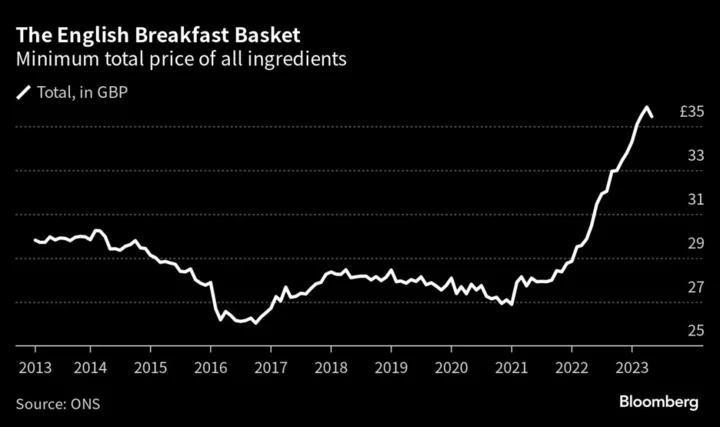A full English breakfast has got cheaper for the first time since Bloomberg started an index measuring the cost of ingredients nearly a year ago.
The total price of all the components of a fry-up fell by 43 pence (55 cents) to £35.44 in May. Bloomberg’s Breakfast Index uses product sizes provided by the Office for National Statistics to crunch prices of sausages, bacon, eggs, bread, butter, tomatoes, mushrooms, milk, tea and coffee.
“While some prices continue to rise, we are now seeing regular news reports of falling prices on many essential products,” said Helen Dickinson, chief executive of the British Retail Consortium.
Still, the cost is well above where it was a year ago. Tesco Plc Chief Executive Officer Ken Murphy warned last week that grocery prices are unlikely to return to where they were before Russia’s invasion of Ukraine.
Almost every category dropped in price from a month earlier, with the exception of bacon. The average price of the ingredients fell by 1.6% from April, compared with a 0.5% increase the month before.
Supermarkets are cutting prices wherever possible in a bid to woo shoppers in Britain’s competitive grocery market. Discounters Aldi and Lidl are gaining market share from their more established rivals as consumers try to save pennies and buy more own-brand goods.
Marks & Spencer Group Plc unveiled price cuts on more than 70 items earlier this week, and locked prices on another 150. Morrisons announced its sixth round of price cuts this year on Monday, affecting nearly 50 products and costing the retailer £26 million.
Grocers say they are passing any easing of price pressures to consumers wherever possible and have dismissed accusations of profiteering. Price reductions have targeted basics including milk, bread and butter which were most affected by inflation.
Tesco’s cuts also include pasta, broccoli and cooking oils while J Sainsbury Plc has reduced prices on toilet paper and more than 40 dairy products.
Prime Minister Rishi Sunak has reportedly abandoned plans for voluntary price caps on groceries after broad opposition from the industry. M&S chairman Archie Norman called the idea “harebrained” while Stuart Rose, chairman of Asda, said interventions would be “clumsy.”
Still, most elements of the English breakfast rose in price versus a year earlier. Broader inflation in the UK is proving sticky with the Consumer Prices Index rising the same amount in May as the month before. Traders expect the Bank of England to raise interest rates to near 6% by December, driving up the cost of mortgages.
“There is a tiny bit of good news and that’s the rate at which food prices are rising, which has slowed,” said Danni Hewson, head of financial analysis at AJ Bell. “But it will be little comfort to all those facing huge increases in their monthly mortgage payments.”
This story was produced with the assistance of Bloomberg Automation.
--With assistance from Leonid Bershidsky.









